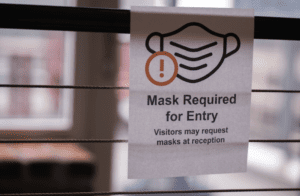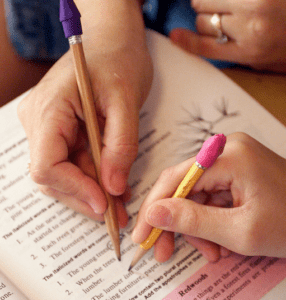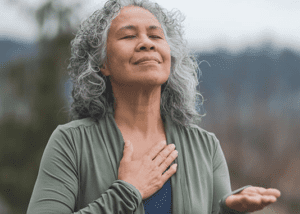Children, adolescents, and spouses in the midst of isolation, anxiety, depression, and even suicidal tendencies, will benefit from this interview with a mental health professional, and military spouse.
When the pandemic hit in March 2020, Kristina Durene suddenly found herself being schoolteacher to her child while also serving part-time as a licensed mental health counselor. Because her Army husband was away on assignment, she faced the onslaught of COVID-19 and the “new norm” without the present support of her husband.

Washington was a state that shut down fairly quickly. Soon, Kristina’s counseling load increased as she began helping both children and adults in crisis who faced a world like none they had ever seen—one plagued by COVID-19.
In-class schools and businesses began halting indefinitely, and students shifted toward virtual learning while a large sum of parents worked from home. No longer did students have the social outlets of friends, school, and extra-curriculars. Americans began a new era of facing isolation, loneliness, heightened anxiety, and a “virtual world.”
God knew what He was doing, Kristina says, by having transitioned her from a secular mental health practice to one where she could now share her faith in Jesus Christ.
Many of the students and parents Kristina counsels are facing a multitude of issues as a direct result of COVID-19. During the shutdown, virtual schoolwork initially had little to no hard deadlines. But as time progressed, students found themselves overwhelmed as they endeavored to keep up with their assignments. In many ways, self-paced schooling has caused anxiety for many students. In addition, parents who were suddenly having to home school, or facilitate virtual school for their children, faced extreme challenges.
For students, the thought of all the assignments piling up, while trying to maintain their grades, became extremely stressful. Students simply did not have the teacher support they typically experienced in the classroom, which is often a necessary component of learning. For many students, their grades began to plummet, causing increased anxiety and depression—even for students who normally have fewer academic challenges in school. As states begin re-opening, students shifting back into the academic world are facing additional anxieties due to returning to classrooms that look and operate differently that before.
“As adults, we often have more strategies and coping mechanisms to deal with life’s stressors,” says Kristina. “Children who are still growing and developing their own coping strategies and mental resources may struggle with all of the changes to their daily lives, as they have a more fragile element of control over their world. The fact that children and adolescents do not know exactly what they will face, and what their friends are facing, all mixes into the emotional challenges many kids are facing today.”
For the military family, COVID-19 has greatly compounded a large portion of the stressors and difficulties already faced by this population.
When the pandemic hit, Kristina says she learned very quickly that she was not cut out to be a home-school mom as her mom was: “I reached a point, where I realized that, for the sake of my relationship with our oldest son, I had to release a bit of the control. I was holding so tightly to when it came to managing his school work. I reached out to his teacher and even the school principal, to discuss strategies to best support him. He is very bright, but the combination of me micro-managing his work and this new virtual learning prompted anxiety for both him and I. When I released control, and focused on being just mom, the stress for both of us decreased drastically and he is managing hybrid-learning wonderfully now.”
Suddenly, Kristina saw the same scenario unfolding with multitudes of her clients. “Soon I was talking to parents about staying in their lane without having to be a micromanager parent as I had been,” Kristina says.
From her experience as a clinician, a “military brat” as a kid, a mother herself, and a wife of a career Army officer who is away on assignment about fifty percent of the time, Kristina says: “I get it! I understand from my own experiences what military parents are facing during this strange time we are living in.”
From this experience and training, Kristina offers the following suggestions on how to cope during this COVID-19 crisis.
Stress Relievers

“I can speak as a spouse and a mother—as my husband has been away for much of the COVID season,” says Kristina. “I’m grateful I get to work in an environment where I can share my faith, and that was something very important and not possible when working in the secular world. I don’t always give the Sunday School answer and quote Scripture; but my faith absolutely shapes the work I do, as I weave it into each session. I find that so often, my faith, as well as the tools and skills I have learned in school and through ongoing training, complement each other well, blending together beautifully.”
Kristina is a big advocate for kids and parents getting involved in nature together. Going on hikes and being outdoors gives students and parents an outlet, and aids in developing effective coping mechanisms to COVID-19 rather than being stuck indoors day-in and day-out.
On a more clinical or therapeutic approach, Kristina says there are many coping mechanisms. “What always sounds so basic, is to be mindful of your breathing when you become anxious,” she says. “Physiologically, engaging in deep breathing stimulates the body’s parasympathetic nervous system, which leads to feeling more peace and calm; it allows the anxious person to quiet their thoughts so that they can more intentionally replace the lies and distortions their anxiety is telling them.
Another technique she recommends called Grounding, is using your five senses in dealing with distressful emotions. “This helps the individual stay present in the moment and can reduce anxiety and distress. This is done by identifying five things you can see; four things you can touch, three things you can hear, two things you can smell, and one thing you can taste.”
Kristina also encourages her clients to engage in their natural support systems (friends, coworkers, family) and their faith support systems (church, small groups, and faith-based groups).
Not a Spirit of Fear
Kristina bases her practice as a born-again Christian and mental health therapist on the Scripture passage 2 Timothy 1:7: “For God has not given us a spirit of fear, but of power and of love and of a sound mind” (NKJV).
“Fear often lies to us; yes there is a natural biological, and instinctual response to fear that is meant for our survival, but we should not succumb to fear

in our day-to-day lives,” says Kristina. “We live in a world often driven by fear, but the life focused on God gives us the spirit of power, love, and a sound mind. As I operate from a position of power and of love as God does, it changes the manner in which I respond to others.
“For example, as a soldier’s wife, I honor my husband’s sacrifice to our country. I strive to be more understanding and patient with the unpredictability of it, because I endeavor to operate through God’s spirit of power and love. My husband has little-to-no control over assignments, duty stations, training dates, etc.; the Uncle Sam has that. I’m learning to respond better by understanding and applying this Scripture. I don’t get it perfect, not by a long shot, but when I actively work to operate through love, I’m not manipulated by the external things of the world—and I more readily see through the lens of God’s love.”
“And in God’s power, I have the ability to set the tone and atmosphere of honor and love,” she says. “With sound mind comes wise thinking. It’s not God’s design for my mind to spiral and be stuck in confusion and chaos—but to function in wisdom and understanding. So, when I put this Scripture into practice, it addresses my total being and how I operate. In my practice, I work to teach this principle to my clients as well because I know that God’s desire is for them to also walk in power, love, and sound mind and that in doing so, their lives will be so profoundly changed.”
Worship and Community Lessens Fear
Kristina says she always explores what her clients fill their minds and hearts with—whether literature, music, entertainment or social media, or the additional influence of others. “People don’t always realize what bearing their forms of entertainment have on their minds,” Kristina says. “What we engage in either eases us or diseases us. I don’t believe God has given me this position inherently to reform or rehabilitate people; that’s God’s job. But I pray He works through me. Rather than placing my focus on the maladaptive and unhealthy influences in their lives, I often take a ‘add-in’ approach where we can add in more positive and healthy influences.”
For Kristina, worship is crucial to her overall health, and she encourages her clients to consider how worship might impact their way of thinking. “Or I might ask them, ‘When was the last time you met with your prayer or support group? Or within reason, what can be added to your life to help with your mental and overall health? Are there things you’ve wanted to incorporate in your daily life but have struggled with adding in?’” says Kristina. “Then we develop a plan to integrate those things.”
Communicate Frequently with Your Soldier
During this pandemic, one of the key components for helping kids and spouses of soldiers stay grounded is to keep connected with their soldiers while they are away from home. Kristina encourages her clients to communicate the small, daily things going on in their lives with their military parents / spouses while on deployment or away for training.

“For example, when I photograph or video record my son’s soccer games that my husband misses and then send them to him, he is appreciative of being able to somehow be a part of our sons’ lives,” says Kristina.
Kristina shares many of their son’s activities and school sporting events with her husband. In doing so, this helps him “be there” through technology and connecting with the everyday things in life.
“Through technology, my husband is even able to remotely help my son with his math,” says Kristina. “Just the simple things help maintain the bond. Playing online games with each other is a favorite activity for our sons and my husband. Staying connected in these ways, ensures that when he comes home, the changes are less drastic and he has been able to be involved as much as possible while away.”
COVID-19 and “The Flow”
Kristina knows full well how important “going with the flow” is for military families—a healthy outlook that is critical. Doing so, she notes, makes the military family more resilient, more adaptive, and more flexible to not only military life in general, but also throughout this past year during the COVID-19 pandemic and what the future looks like for them.
“It helps to have a, ‘I’ll see what the road looks like when I get there’ attitude,” says Kristina. “When you can’t readily receive the support you need from your spouse when he or she is deployed or on TDY, the unpredictability of COVID has the potential to be difficult for military families.”
For this reason, Kristina advises that spouses of service members connect with the resources the military has to offer: “Whether that be the spouses’, groups on base, or the chaplains and mental health providers who can offer help, or the military spouses with whom you are friends. Find out what resources are available and tap into them.”




